How to create a financial forecast for a web agency?
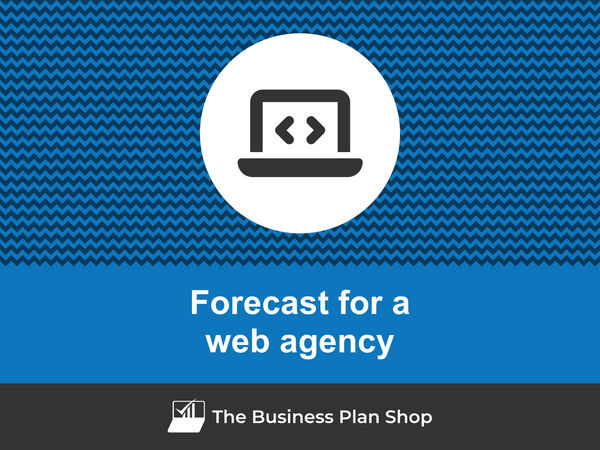
Developing and maintaining an up-to-date financial forecast for your web agency is key in order to maintain visibility on your business’s future cash flows.
If you feel overwhelmed at the thought of putting together a web agency financial forecast then don’t worry as this guide is here to help you.
We'll cover everything from: the main objectives of a financial forecast, the data you need to gather before starting, to the tables that compose it, and the tools that will help you create and maintain your forecast efficiently.
Let's get started!
Why create and maintain a financial forecast for a web agency?
The financial projections for your web agency act as a financial blueprint to guide its growth with confidence and ensure its long-term financial viability.
To create them, you will need to look at your business in detail - from sales to operating costs and investments - to assess how much profit it can generate in the years to come and what will be the associated cash flows.
During challenging market conditions, maintaining an up-to-date financial forecast enables early detection of potential financial shortfalls, allowing for timely adjustments or securing financing before facing a cash crisis.
Your web agency's financial forecast will also prove invaluable when seeking financing. Banks and investors will undoubtedly request a thorough examination of your financial figures, making precision and presentation essential.
Need a convincing business plan?
The Business Plan Shop makes it easy to create a financial forecast to assess the potential profitability of your projects, and write a business plan that’ll wow investors.

What information is used as input to build a web agency financial forecast?
A web agency's financial forecast needs to be built on the right foundation: your assumptions.
The data required to create your assumptions will depend on whether you are a new or existing web agency.
If you are creating (or updating) the forecast of an existing web agency, then your main inputs will be historical accounting data and operating metrics, and your team’s view on what to expect for the next three to five years.
If you are building financial projections for a new web agency startup, you will need to rely on market research to form your go-to-market strategy and derive your sales forecast.
For a new venture, you will also need an itemised list of resources needed for the web agency to operate, along with a list of equipment required to launch the venture (more on that below).
Now that you understand what is needed, let’s have a look at what elements will make up your web agency's financial forecast.
The sales forecast for a web agency
From experience, it is usually best to start creating your web agency financial forecast by your sales forecast.
To create an accurate sales forecast for your web agency, you will have to rely on the data collected in your market research, or if you're running an existing web agency, the historical data of the business, to estimate two key variables:
- The average price
- The number of monthly transactions
To get there, you will need to consider the following factors:
- Client demand: The average price and number of monthly transactions may be affected by the level of demand for web agency services. If there is high demand, you may be able to charge higher prices for your services and increase the number of transactions.
- Competition: Your pricing and number of transactions may also be influenced by the level of competition in the web agency industry. If there are many other agencies offering similar services, you may need to adjust your prices or offer unique services to stand out and attract more clients.
- Technological advancements: As technology continues to advance, the average price and number of monthly transactions in the web agency industry may be affected. For example, if there is a new platform or tool that becomes popular for website design, it may impact your pricing and the types of services you offer.
- Economic conditions: The state of the economy can also play a role in your sales forecast. During times of economic downturn, businesses may have tighter budgets and be less likely to invest in web agency services, which could lead to a decrease in both average price and number of transactions.
- Industry trends: It's important to stay up-to-date on industry trends and changes in client preferences. For example, if there is a shift towards mobile website design or a demand for more interactive features, you may need to adjust your pricing and services accordingly.
Once you have an idea of what your future sales will look like, it will be time to work on your overhead budget. Let’s see what this entails.
Need a convincing business plan?
The Business Plan Shop makes it easy to create a financial forecast to assess the potential profitability of your projects, and write a business plan that’ll wow investors.

The operating expenses for a web agency
The next step is to estimate the costs you’ll have to incur to operate your web agency.
These will vary based on where your business is located, and its overall size (level of sales, personnel, etc.).
But your web agency's operating expenses should normally include the following items:
- Staff costs: This includes salaries, wages, benefits, and training for your team of web developers, designers, project managers, and other employees.
- Accountancy fees: You may need to hire an accountant or bookkeeper to handle your financial records, taxes, and other financial matters.
- Insurance costs: As a web agency, you may need to invest in professional liability insurance, business insurance, and cyber liability insurance to protect your company from potential risks and lawsuits.
- Software licenses: To provide high-quality services, you may need to purchase licenses for web design and development software such as Adobe Creative Suite, Sketch, or InVision.
- Banking fees: These include transaction fees, wire transfer fees, and other fees associated with managing your business bank account.
- Marketing and advertising expenses: To attract clients and promote your services, you may need to invest in digital marketing campaigns, social media ads, and other forms of advertising.
- Office rent: If you have a physical office space, you will need to pay rent or lease fees to cover your monthly or annual rent.
- Utilities: This includes electricity, water, internet, and other utility expenses for your office space.
- Professional development: To stay competitive in the ever-evolving web industry, you may need to invest in conferences, workshops, and other forms of professional development for yourself and your team.
- Travel expenses: Depending on your business model, you may need to travel for client meetings, conferences, or other business-related trips.
- Office supplies: This includes furniture, computers, printers, and other necessary supplies for your office.
- Telecommunication expenses: As a web agency, you will likely need to invest in phone plans, internet plans, and other telecommunication services to communicate with clients and team members.
- Website hosting and domain fees: If you offer website hosting services, these costs will include server fees, domain registration fees, and other related expenses.
- Software subscriptions: In addition to software licenses, you may also need to pay for monthly or annual subscriptions for project management tools, time tracking software, and other essential tools for running your web agency.
- Legal fees: To protect your business and ensure compliance, you may need to hire a lawyer for legal advice, contract review, and other legal services.
This list is not exhaustive by any means, and will need to be tailored to your web agency's specific circumstances.
What investments are needed to start or grow a web agency?
Creating and expanding a web agency also requires investments which you need to factor into your financial forecast.
Capital expenditures and initial working capital items for a web agency could include elements such as:
- Computer equipment: This includes purchasing desktop computers, laptops, servers, and other necessary hardware for your web agency. These items are essential for your employees to perform their daily tasks and for your agency to run smoothly.
- Software licenses: Investing in software licenses is crucial for a web agency to provide services to clients. This includes licenses for design software, project management tools, and other necessary software for your agency.
- Office furniture: As a web agency, you will need a functional and comfortable office space for your employees to work in. This includes desks, chairs, and other office furniture to create a productive and professional work environment.
- Website development tools: In order to provide top-notch web design services, you will need to invest in website development tools such as coding software, plugins, and other necessary tools to create and maintain websites for clients.
- Networking and infrastructure: A reliable and efficient network and infrastructure are crucial for a web agency to operate smoothly. This may include purchasing routers, switches, and other necessary equipment to ensure a stable and secure network for your agency.
Again, this list is not exhaustive and will need to be adjusted according to the circumstances of your web agency.
Need a convincing business plan?
The Business Plan Shop makes it easy to create a financial forecast to assess the potential profitability of your projects, and write a business plan that’ll wow investors.

The financing plan of your web agency
The next step in the creation of your financial forecast for your web agency is to think about how you might finance your business.
You will have to assess how much capital will come from shareholders (equity) and how much can be secured through banks.
Bank loans will have to be modelled so that you can separate the interest expenses from the repayments of principal, and include all this data in your forecast.
Issuing share capital and obtaining a bank loan are two of the most common ways that entrepreneurs finance their businesses.
What tables compose the financial plan for a web agency?
Now let's have a look at the main output tables of your web agency's financial forecast.
The projected profit & loss statement
The projected profit & loss shows how profitable your web agency is likely to be in the years to come.
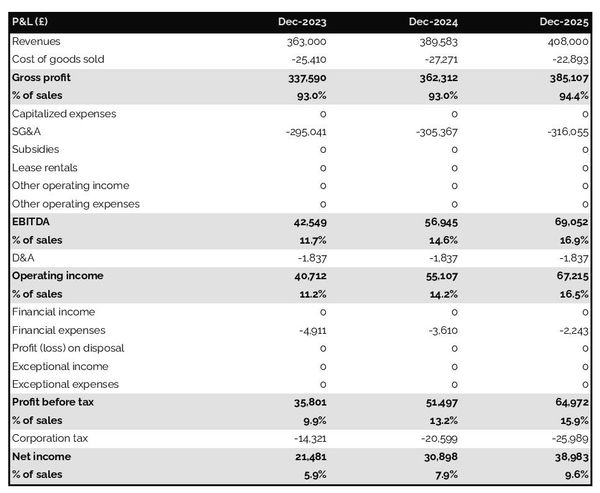
For your web agency to be financially viable, your projected P&L should ideally show:
- Sales growing above inflation (the higher the better)
- Profit margins which are stable or expanding (the higher the better)
- A net profit at the end of each financial year (the higher the better)
This is for established web agencies, there is some leniency for startups which will have numbers that will look a bit different than existing businesses.
The projected balance sheet
Your web agency's forecasted balance sheet enables you to assess your financial structure and working capital requirements.
It is composed of three types of elements: assets, liabilities and equity:
- Assets: represent what the business owns and uses to produce cash flows. It includes resources such as cash, equipment, and accounts receivable (money owed by clients).
- Liabilities: represent funds advanced to the business by lenders and other creditors. It includes items such as accounts payable (money owed to suppliers), taxes due and loans.
- Equity: is the combination of what has been invested by the business owners and the cumulative profits and losses generated by the business to date (which are called retained earnings). Equity is a proxy for the value of the owner's stake in the business.
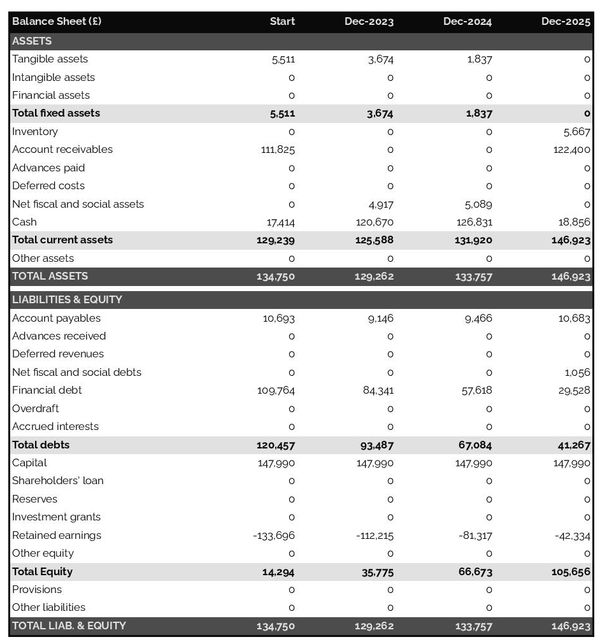
The cash flow projection
The cash flow forecast of your web agency will show how much cash the business is expected to generate or consume over the next three to five years.
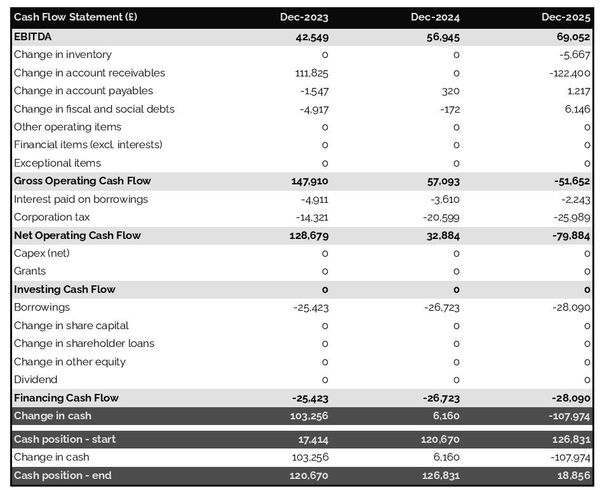
There are multiple ways of presenting a cash flow forecast but from experience, it is better to organise it by nature in order to clearly show these elements:
- Operating cash flow: how much cash is generated by the web agency's operations
- Investing cash flow: what is the business investing to expand or maintain its equipment
- Financing cash flow: is the business raising additional funds or repaying financiers (debt repayment, dividends)
Your cash flow forecast is the most important element of your overall financial projection and that’s where you should focus your attention to ensure that your web agency is adequately funded.
Note: if you are preparing a financial forecast in order to try to secure funding, you will need to include both a yearly and monthly cash flow forecast in your web agency's financial plan.
Need a convincing business plan?
The Business Plan Shop makes it easy to create a financial forecast to assess the potential profitability of your projects, and write a business plan that’ll wow investors.

Which tool should you use to create your web agency's financial projections?
Building a web agency financial forecast is not difficult provided that you use the right tool for the job. Let’s see what options are available below.
Using online financial forecasting software to build your web agency's projections
The modern and easiest way is to use professional online financial forecasting software such as the one we offer at The Business Plan Shop.
There are several advantages to using specialised software:
- You can easily create your financial forecast by letting the software take care of the financial calculations for you without errors
- You have access to complete financial forecast templates
- You get a complete financial forecast ready to be sent to your bank or investors
- You can easily track your actual financial performance against your financial forecast, and recalibrate your forecast as the year goes by
- You can create scenarios to stress test your forecast's main assumptions
- You can easily update your forecast as time goes by to maintain visibility on future cash flows
- You have a friendly support team on standby to assist you when you are stuck
- It’s cost-efficient and much cheaper than using an accountant or consultant (see below)
If you are interested in this type of solution, you can try our forecasting software for free by signing up here.
Hiring a financial consultant or chartered accountant
Hiring a consultant or chartered accountant is also an efficient way to get a professional web agency financial projection.
As you can imagine, this solution is much more expensive than using software. From experience, the creation of a simple financial forecast over three years (including a balance sheet, income statement, and cash flow statement) is likely to start around £700 or $1,000 excluding taxes.
The indicative estimate above, is for a small business, and a forecast done as a one-off. Using a financial consultant or accountant to track your actuals vs. forecast and to keep your financial forecast up to date on a monthly or quarterly basis will naturally cost a lot more.
If you choose this solution, make sure your service provider has first-hand experience in your industry, so that they may challenge your assumptions and offer insights (as opposed to just taking your figures at face value to create the forecast’s financial statements).
Why not use a spreadsheet such as Excel or Google Sheets to build your web agency's financial forecast?
Creating an accurate and error-free web agency financial forecast on Excel (or any spreadsheet) is very technical and requires both a strong grasp of accounting principles and solid skills in financial modelling.
Most entrepreneurs lack the expertise required to create an accurate financial forecast using spreadsheet software like Excel or Google Sheets. As a result, it is unlikely anyone will trust your numbers.
The second reason is that it is inefficient. Building forecasts on spreadsheets was the only option in the 1990s and early 2000s, nowadays technology has advanced and software can do it much faster and much more accurately.
This is why professional forecasters all use software. With the rise of AI, software is also becoming smarter at helping us detect mistakes in our forecasts and helping us analyse the numbers to make better decisions.
Finally, like everything with spreadsheets, tracking actuals vs. forecasts and updating your forecast as the year progresses is manual, tedious, error-prone, and time-consuming. Whereas financial forecasting software like The Business Plan Shop is built for this.
Need a convincing business plan?
The Business Plan Shop makes it easy to create a financial forecast to assess the potential profitability of your projects, and write a business plan that’ll wow investors.

Use our financial forecast templates for inspiration
The Business Plan Shop has dozens of financial forecast examples available.
Our templates contain both a financial forecast and a written business plan which presents, in detail, the company, the team, the strategy, and the medium-term objectives.
Our templates are a great source of inspiration, whether you just want to see what a complete business plan looks like, or are looking for concrete examples of how you should model financial elements in your own forecast.
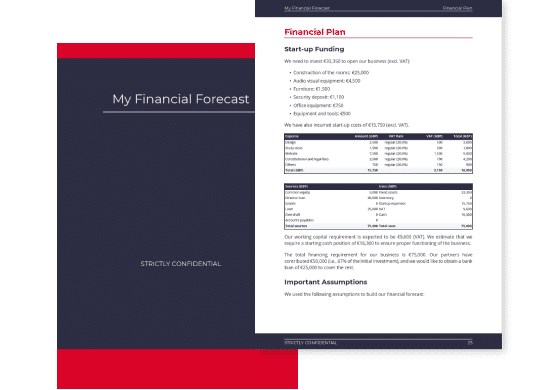
Takeaways
- A financial projection shows expected growth, profitability, and cash generation for your business over the next three to five years.
- Tracking actuals vs. forecast and keeping your financial forecast up-to-date is the only way to maintain visibility on future cash flows.
- Using financial forecasting software makes it easy to create and maintain up-to-date projections for your web agency.
You have reached the end of our guide. We hope you now have a better understanding of how to create a financial forecast for a web agency. Don't hesitate to contact our team if you have any questions or want to share your experience building forecasts!
Need a convincing business plan?
The Business Plan Shop makes it easy to create a financial forecast to assess the potential profitability of your projects, and write a business plan that’ll wow investors.

Also on The Business Plan Shop
- Example of financial projections
- How to create a turnover forecast for a business?
- Financial forecast template for a business idea
Know someone who runs or wants to start a web agency? Share our financial projection guide with them!




